


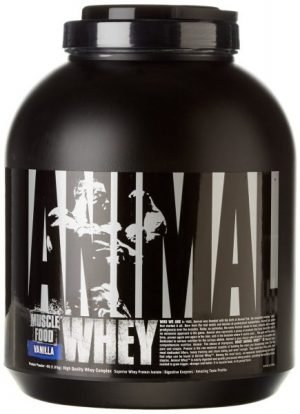



Looking for a protein powder that's free from lactose?
You've come to the right place.
Protein powders have been hailed as the magic potion for instant muscle growth.
While that might be a bit of an exaggeration, there's no denying the crucial role protein plays in our bodies.
Made from American Cows, Whey Protein Isolate is a fully transparent grass fed whey from Transparent Labs.
It's a whey isolate and only contains 0.5g fat and 1g carbs per serving.
With its impressively low-carb content, organic credentials, all-natural ingredients, and a price tag that won't break the bank, Transparent Labs' Organic Vegan Rice & Pea Protein ticks a lot of boxes. While the taste might not be everyone's cup of tea and it could pack a bit more of a nutritional punch, the benefits certainly tip the scales in its favor.
Protein powders are a convenient way to ensure we're getting enough of this vital nutrient to support muscle repair and hormone production, among other things.
But here's the thing:
They're called supplements for a reason.
They're designed to supplement your diet, not take over it.
And let's not forget about BCAAs (branched-chain amino acids).
These little guys are a big deal when it comes to recovery.
In this guide, we'll dive into the world of whey protein isolates, breaking down their calorie content, macros, and ingredients.
So, let's get started on finding the best protein for you...
Made from American Cows, Whey Protein Isolate is a fully transparent grass fed whey from Transparent Labs.
It's a whey isolate and only contains 0.5g fat and 1g carbs per serving.
Transparent Labs – the name says it all about this company and their commitment to open labeling and premium quality is never more clear than it is with ProteinSeries 100% Grass Fed Whey Protein Isolate.
They have set the standards high for creating nutritional supplements with high quality ingredients.
While this is a bit more expensive than your average protein powder, grass fed whey comes at a higher cost, which is understandable since it costs more to produce this type of powder.
If you compare this to their whey concentrate, this is a much cleaner product with less than 1 gram of sugar, 1 gram of carbs and zero fat.
Whey isolate has a higher protein content (90%) than concentrate without the fat or carbs.
This is the protein powder to get if you're losing weight and cutting.
They even disclose the flavoring and sweeteners so you know exactly what you're getting..
Transparent Labs has been in the business for years and they've created quite a reputation for themselves with their level of transparency and quality.
But now, you're probably asking, how does it taste?
It tastes great but keep in mind, it has basic and natural flavorings.
It's ideal as it's better to have the bare minimum.
As far as value, you’re getting 30 servings for a premium price, so again, you get what you pay for.
All in all, Transparent Labs ProteinSeries 100% Grass Fed Whey Protein Isolate is one of the best choices, for anyone following the Paleo diet or looking for something that is simply protein without the carbs or fat.
It's one of the lowest calorie protein powders we've found.
Use discount code FITFREK.
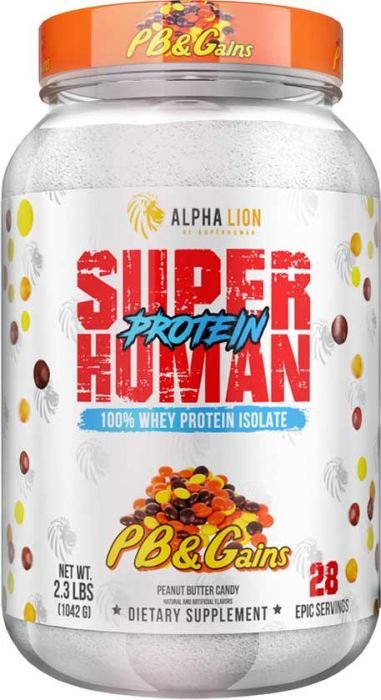
28 Servings, 33g Scoops, 25g Protein, 130 Calories, 1g Fat, 5g Carbohydrates, 100mg DigeZyme, 50mg AstraGin
Superhuman Protein is a easy to digest protein isolate.
It's made with 2 absorption enhancing blends, Astragin and DigeZyme, so if you've ever had stomach issues with a isolate, then this may be the best choice for you.
It has 28 servings of 33g scoop packed with 25g protein.
The carb content is on the higher side, with 5g per serving.
Superhuman Protein Isolate is one of the tastier protein powders we've tried and it doesn't come to a surprise that it has 5g carbs as it tastes excellent.
With flavors like anabolic pepples, peanut butter and gains, and more, you'll feel like you're having a delicious cheat meal as the flavors are excellent.
And the calorie content is higher than most protein choices so if you're not counting calories or on a strict diet, then Superhuman Whey Protein Isolate is great.
Use coupon code FITFREK.
High quality, delicious whey protein isolate at a reasonable price. 'nuff said. 100% whey protein isolate, 3rd-party tested for purity and absence of banned substances.
When it comes to top-tier, lactose-free protein options for competitive athletes, Kaged's Whey Protein Isolate takes the crown. With rigorous testing for banned substances, it offers peace of mind for athletes aiming to compete clean.
This protein powder isn't your run-of-the-mill supplement. It undergoes an advanced micro-ultrafiltration process that meticulously reduces lactose, fats, and cholesterol, making it a lean, mean, muscle-building machine.
But what sets Kaged's Whey Protein Isolate apart is its use of MicroPure Whey Protein Isolate. This ingredient is often hailed as the gold standard in protein quality, and for good reason. It's packed with a bounty of amino acids and six BCAAs, all geared towards helping your muscles bounce back after an intense workout.
However, it's worth noting that this product does use a sugar alternative. So, if you're someone who's steering towards a more natural diet, this might not be your first pick.
Here's a quick rundown of the key ingredients:
With its impressively low-carb content, organic credentials, all-natural ingredients, and a price tag that won't break the bank, Transparent Labs' Organic Vegan Rice & Pea Protein ticks a lot of boxes. While the taste might not be everyone's cup of tea and it could pack a bit more of a nutritional punch, the benefits certainly tip the scales in its favor.
Calling all vegans! Rest assured, we've got something special for you too.
Transparent Labs' Rice & Pea Protein Powder takes the top spot on our list for the best organic, vegan, and lactose-free protein powder.
If lactose is a no-go for you, this protein powder is your perfect match.
Being on a plant-based diet can sometimes mean protein takes a backseat.
That's where this Rice & Pea Protein Powder by Transparent Labs steps in.
And if you're lactose intolerant, you can meet your protein needs without the worry of hidden ingredients or potential digestive discomfort.
Your workout regimen won't miss a beat. And the cherry on top? It's free from added sugars, GMOs, and soy protein.
Here's the lowdown on the key ingredients:
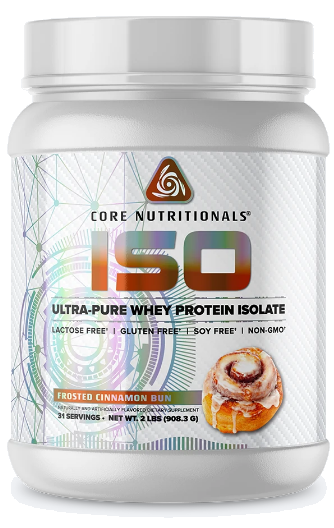
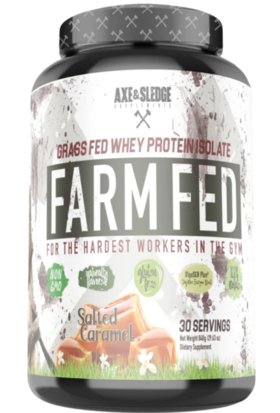
30.4g Scoops, 30 Servings, 110 Calories, 23.9g Protein, 1.8g Carbs, 1.1g Fat (0.5 Saturated)
Axe and Sledge creates supplements for the hardest workers.
Their no-fluff supplements has brought many additions and updates to our rankings, including in our joint support guide.
Farm Fed Whey Isolate is one that's already been added to our grass fed protein list, but it's not only grass fed, it's also an isolate.
In every 30 gram scoop there's 24g protein, making it one of the few choices that is mostly made out of protein.
Most protein powders will have at least 10g of extra ingredients after protein.
While the calories is on the upper end with 110, it makes up by having one of the best choices for having a wide selection of incredible, uncommon flavors.
Because of this, it has 2g carbs and 1.1g fat per serving, which is not bad for carbs but on the high end for fat content in a whey isolate.
However you do want the fat content in a grass fed protein because that's where the omega 3 fatty acids are at.
Use discount code FITFREK.
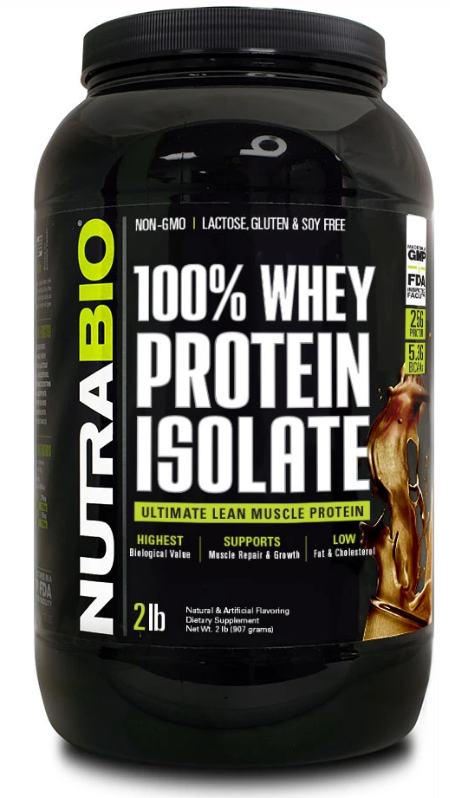
80 Servings, 28.19g Scoops, 25g Protein, 110 Calories, 1g Carbohydrates
NutraBio has been delivered the highest standards in supplements since 1996.
They are one of the few companies that formulated supplements with full disclosure, including disclosing the “other” ingredients like flavoring and sweeteners, they don't use any sort of prop blends.
Both protein supplements, Whey Isolate and Classic Whey are good choices.
But if you want a lactose free whey then go with the Isolate version.
Isolate has different flavoring options that are unique, like breakfast flavors.
These protein powders do not cause any bloating or gas issues that are commonly found in other supplements.
NutraBio is an excellent choice for their protein powders and all of their supplements follow the same high standards.
Use discount code FITFREK5.
Protein is an essential nutrient that plays a crucial role in the body's growth, repair, and maintenance.
For those who are lactose intolerant or sensitive to dairy, finding a suitable protein supplement can be challenging.
This is where lactose-free protein powder comes in.
Lactose-free protein powder is a dietary supplement designed for those who want to increase their protein intake without consuming lactose, a type of sugar found in dairy products.
This product is particularly beneficial for individuals who are lactose intolerant or have a sensitivity to dairy products.
Lactose intolerance is a common digestive disorder where the body is unable to fully digest lactose.
Symptoms can include bloating, diarrhea, and abdominal cramps.
By choosing a lactose-free protein powder, individuals with this condition can still reap the benefits of protein supplementation without the discomfort associated with lactose consumption.
Lactose-free protein powders are typically made from either plant-based sources or whey protein isolate.
Plant-based protein powders, such as those made from peas, rice, or hemp, are naturally lactose-free.
On the other hand, whey protein isolate undergoes a process that removes most of the lactose, making it a suitable option for those with lactose intolerance.
In addition to being lactose-free, these protein powders often offer other benefits.
For instance, plant-based protein powders are usually vegan-friendly and may contain additional nutrients from plant sources.
Whey protein isolates, on the other hand, is highly concentrated in protein and low in fats and carbohydrates, making it an excellent choice for those looking to build muscle or lose weight.
Lactose-free protein powder offers several benefits:
Digestibility: As it does not contain lactose, it is easier to digest for those with lactose intolerance or sensitivity.
Versatility: It can be used in a variety of ways, such as in shakes, smoothies, or baked goods.
Nutrient-Rich: Many lactose-free protein powders are packed with essential nutrients, including vitamins, minerals, and amino acids.
Dietary Restrictions: It is suitable for those following a vegan or vegetarian diet, as well as those with specific dietary restrictions or allergies.
There are several types of lactose-free protein powders available on the market:
Whey Protein Isolate: This is a form of whey protein that has been processed to remove most of the lactose. It is high in protein and low in fat and carbs.
Plant-Based Proteins: These include proteins derived from peas, rice, hemp, and other plant sources. They are naturally lactose-free and are a great option for vegans and vegetarians.
Egg White Protein: This is a high-quality, lactose-free protein source that is rich in essential amino acids.
Beef Protein Isolate: This is a lactose-free protein source derived from beef. It is high in protein and low in fat and carbs.
When choosing a lactose-free protein powder, consider the following factors:
Protein Content: Look for a product with a high protein content per serving.
Ingredients: Check the ingredient list to ensure it does not contain any allergens or ingredients you are sensitive to.
Taste and Mixability: Choose a product that tastes good and mixes well.
Price: Consider the cost per serving and choose a product that fits within your budget.
Sactose-free protein powder is a versatile and nutrient-rich supplement that can be a great addition to your diet, especially if you are lactose intolerant or sensitive to dairy.
Always consult with a healthcare professional before using any new supplement.
Protein powder is a versatile supplement that can benefit a wide range of individuals:
Athletes and Fitness Enthusiasts: Those who engage in regular physical activity, especially strength and endurance training, have higher protein needs. Protein powder can help meet these needs and support muscle recovery and growth.
People on a Weight Loss Journey: Protein can help increase feelings of fullness, which can aid in weight loss by reducing overall calorie intake. Plus, maintaining a high protein intake can help preserve muscle mass during weight loss.
Vegetarians and Vegans: Those following plant-based diets may struggle to get enough protein from food alone. Plant-based protein powders can help fill this gap.
Individuals with Dietary Restrictions: For those with lactose intolerance, allergies, or other dietary restrictions, specific types of protein powders can provide a safe and convenient source of protein.
Older Adults: As we age, our protein needs increase to help combat age-related muscle loss. Protein powder can be an easy way to increase protein intake.
The amount of protein you should consume depends on various factors, including age, sex, activity level, and health goals.
As a general guideline, the Recommended Dietary Allowance (RDA) for protein is 46 grams per day for women and 56 grams per day for men.
However, these values are the minimum amounts needed to meet basic nutritional requirements.
For those who are physically active, aiming for 1.2 to 2.0 grams of protein per kilogram of body weight is often recommended.
For example, a 150-pound (68 kg) person who exercises regularly might aim for 82 to 136 grams of protein per day.
It's important to note that while protein powders can help meet your protein needs, they should not replace whole foods entirely.
Aim to get most of your protein from whole food sources, using protein powder to supplement your diet as needed.
Always consult with a healthcare professional or a registered dietitian to determine the right amount of protein for your individual needs.
When it comes to protein powders, there are almost never ending types, or sources, of protein.
Way back in the 50’s when the first protein powders were being used by bodybuilders, soy was a common source.
By the 60’s quality had improved to milk and egg sources, and it should be noted that egg white protein was considered the highest quality protein available for decades.
Not much happened until whey protein hit the market in the 90’s, it was and still is considered the highest quality protein you can buy.
Today, besides whey, we have many choices, so let’s take a look at each kind, starting first with standard, non-vegetarian proteins.
First, let’s define a term we will be using – the Biological Value, or BV, of a protein is an indicator of the quality of the protein.
It is a measure of a protein's ability to be used by the body or, the percentage of the absorbed protein that your body actually uses.
The other key term we need to look at is digestion speed.
Different proteins digest at different speeds, making one type more useful than other types for specific situations, such as after a workout, when you need a fast digesting protein, or before bed, when a slower digesting protein is best.
Whey protein makes up about 20% of milk protein and has the highest biological value (BV) of any protein source.
For example, milk protein has a BV of 91, while egg protein, long considered the best, has a BV of 100.
However, whey concentrate protein powder has a BV of 104, with whey isolate going as high as 159! (1).
Of course, it’s not as simple as just “whey protein”, there are several types:
Whey protein concentrate is the lowest-quality and cheapest form of whey and has a protein content by weight of anywhere between 35 and 80%, with the remaining content consisting of carbs and fats (2).
When you buy a whey concentrate protein powder, you’ll find it’s thicker and better-tasting than other types of whey.
As far as the rate of digestion, WPC digests in just under 2 hours – whey in general is the fastest digesting protein (2) and the best choice for post workout use or first thing in the morning after a long 8-10 hours without food.
You have to be careful in your choice of whey protein powder from concentrate, because often the label doesn’t tell you the content of protein you’re getting, in this case you may be buying a product that’s considerable under 80% protein.
And it also contains much more than just protein as it has lactose (milk sugar), other types of carbs, and fats.
Besides quality, the primary drawback of WPC is that anyone that has a hard time digesting dairy products will definitely suffer, we’re talking bloating and gastric discomfort.
There’s no need to worry, the best is yet to come!
Whey Protein Isolate is the highest quality, purest source of protein you can buy, whey or otherwise.
In the manufacturing process, all carbs (lactose) and fats from the concentrate powder are removed and a typical WPI is at least 90% protein (3).
Even though whey protein in general comes from milk, if you have any difficulties with lactose, this is the whey protein for you.
Whey isolate contains the ideal combination of amino acids in the perfect concentrations for maximum benefit.
As far as rate of digestion, WPI takes about 2 ½ hours to digest and is more expensive than WPC.
Whey protein hydrolysates are the newest type of whey protein as well as the fastest digesting.
This type of whey has been artificially “predigested” or hydrolyzed.
The idea behind it is that an ultra-fast whey means better results, and in fact whey hydrolysate does digest at a lighting fast 1 ½ hours.
However, it’s also more expensive to manufacture, which means that you have to decide if the extra digestion speed is worth the extra cost.
This type of protein is a good choice if you have digestion problems and need an advantage to help you digest your protein easier.
Otherwise, for many users whey isolate, or a whey blend consisting of all 3 types of whey are the best choices.
Next we have casein protein, and of course there’s more than one type.
Casein is a slower digesting protein, in fact casein can take over 6 hours to digest, depending on the type.
This brings up an important question: which type of protein is the best choice based on digestion speed?
Casein, for example, is perfect just before bed because it can offset catabolism for hours.
It’s also a great choice at the start of a long busy day at school or work when you aren’t sure when you can eat again.
On the other hand, whey digests much faster as we have seen, making it perfect at specific times of the day.
So what’s the answer?
Both!
That’s right, many dedicated bodybuilders and athletes either use both kinds separately or use a product that blends proteins for the ultimate in fast and slower digestion.
Think about it, you get the best of all worlds with a protein blend – fast digesting whey for morning and post workout, and slower digesting proteins for your long day or at night.
What could be better?
OK, casein protein is milk protein, in fact milk protein consists of 20% whey and 80% casein.
There 3 types of casein protein:
This is the lowest quality casein protein but often is the first choice for many casein protein powders.
Typically, casein is an insoluble compound, and you may find your casein protein doesn’t mix as well as whey proteins.
Caseinates consist of calcium, potassium and sodium and typically undergo a special manufacturing process to improve solubility.
This is the purest form of casein protein available.
It’s digested much easier by the body and mixes much better than cheaper forms of casein.
Micellar casein takes over 6 hours to digest, it does this by becoming a gel-like substance in the small intestine which is then slowly released over time, constantly feeding your muscles.
Milk protein isolate consists of 80% casein and 20% whey, making this a popular choice because it has both slow and fast digestion rates.
Milk protein isolates have a high content of amino acids and are easily digested, making them a good choice for other types of protein supplements, such as protein bars.
Beef protein powder has never really taken the market by storm despite numerous attempts over the years.
You might think beef should be an excellent protein source, after all, it’s a complete protein that’s high in amino acids plus it’s a natural source of the proven muscle builder creatine (4).
So why isn’t beef protein a popular choice?
Most beef proteins are made from collagen, which is a poor quality protein source.
The next time you see a beef protein powder or bar, read the label and look for “hydrolyzed gelatin”.
It is commonly used in Jello, just read up the ingredients on those boxes, it refers gelatin this way: “Not a significant source of protein”.
This is a FDA-mandated statement that must be used by manufacturers due to the poor quality of gelatin (5).
The bottom line is that beef is not the ideal protein source you would think, and our best advice is to stick with other, more proven sources of protein.
For years, egg protein powders were the highest quality protein on the market with a BV of 100, good, but not quite as good as whey.
As far as digestion speed, egg protein is considered a medium digesting protein, taking about 4 hours to digest.
The only real drawback with egg protein powders is that they don’t mix well and smell worse.
However, they make a great addition to a protein blend of whey and casein because now you have fast, medium and slow digesting proteins.
One of the fastest-growing supplement sub-categories are plant-based protein powders.
Suddenly, everybody has their vegan-friendly protein powder, designed for vegetarians who do not eat dairy products, vegans who avoid all animal products, and fitness-minded people with allergies make a plant-based protein the best choice.
Vegetarian protein powders have a thick texture with a chalky taste depending on the brand, and they contain a mix of plant proteins which creates a complete protein (contains all the amino acids) of good quality.
Check out our review of the Transparent Labs Organic Vegan Protein Powder.
Here are the most common choices:
Rice protein is a high quality protein that contains all of the essential amino acids, which are the ones that cannot be made by the body.
Some research has indicated rice protein can be as effective as whey protein (6).
Still, most plant based proteins combine rice with other sources.
Most plant proteins are a medium digesting protein, taking a few hours to completely digest.
This is another very common source of protein and often combined with rice protein in many of the plant powders that are seemingly flooding the market.
Like rice protein, pea protein compares well to whey protein (7) and digests as slowly as casein, giving you two great benefits in one protein source.
If there’s a downside, it’s the smell and taste, which is another reason it’s combined with other plant proteins.
Hemp seeds is another plant protein that contains all nine essential amino acids along with Omega 3 and 6 essential fatty acids.
However, a drawback of hemp protein is that it’s low in leucine, lysine and tryptophan.
Leucine is one of the BCAAs and an essential amino acid that’s known as the most anabolic of any amino acid due to its direct stimulation of protein synthesis.
Additionally, it does not digest very well – compare the protein digestibility rating (PDCAAS) of hemp (48) to egg protein (100) and whey (104), and you have a protein that isn’t very bioavailable and does not do a good job stimulating protein synthesis (8).
That’s a deal breaker for us!
Several decades ago, if you wanted a vegan protein source, soy was pretty much it.
Soy protein hit a low spot when it was thought to increase estrogen levels, the female hormone.
However, newer research indicates it is a high-quality protein that contains all of the essential amino acids.
Still, soy does not have the popularity it once had and many vegan protein powders advertise “soy free” on their labels.
Despite the increased popularity of plant-based protein powders on the market, for most bodybuilders, athletes and fitness-minded users, dairy based proteins still offer the highest quality and best taste.
If lactose is not a problem, you can literally choose any whey or casein protein powder either separately or in a combination of the two.
Of course, you’ll ultimately want a high quality product with a good macronutrient profile and our guide can help you with that.
On the other hand, if you have issues with lactose, such as a little bloating and gas, it can be said that you are “lactose sensitive”.
In this case, a whey or milk isolate is a good choice because all the lactose and fats are removed as part of the filtration process.
Many proteins also contain lactase, which is an enzyme that breaks down lactose.
An additional option in this case is to buy separate digestive enzyme tablets that feature lactase, or even lactase drops that you add to your shake.
The point is, even if you have mild problems with lactose, there are solutions.
Whey isolates are the best choice, but there may be some higher quality casein proteins you could use.
If you have more severe issues with lactose, you may be “lactose intolerant” and your choices would be limited to only the cleanest, highest quality whey isolates.
If lactose is out of the question no matter what you do, then dairy based proteins are not an option – that means you’ll have to go with a plant based protein.
Finding one you enjoy the taste of will be a challenge, but the good news is, you have several options to try.
If lactose is not really a primary concern, but the cleanest possible is, then you’ll want a product with no artificial additives and you have some great choices available, as many brands feature all-natural proteins in their line-up.
The bottom line is that no matter how picky you are, more than likely you can find a dairy based protein that will fit your needs.
Check the protein content by weight.
Divide the grams of protein on the label by the scoop size.
For example, we’ll go with 30 grams of protein with a 34 gram scoop, which gives us 88% protein by weight.
This is a common number for even the best whey isolates, so you know you’re getting a premium product.
The general rule of thumb here is at least 85%.
What can affect this number?
Flavorings.
A simple flavor such as good old vanilla does not impact the protein content that much, but more exotic flavors, such as chocolate, will have more impact.
One of the biggest red flags of protein quality is the cholesterol content.
Of course, check the macronutrient profile, check the additives, check the sodium (not everybody does) – but don’t forget to look at the cholesterol.
It should be low because most of it should have been taken out during manufacturing.
For example, if you look at the label of NutraBio’s 100% Whey Isolate, you will see that it has less than 5 mg cholesterol.
Some have even less.
Hint: when analyzing a protein, take the time to see if they have their products third party tested, like NutraBio does.
This verifies the label information and integrity of the company.
So, remember, don’t forget to check the cholesterol content!
As a guideline, a high-quality quality protein source should be:
Cholesterol doesn't seem to be well understood by many people, so it’s important to understand what it is.
First, what is cholesterol?
It can be defined as follows:
Cholesterol is the most common type of steroid in the body.
Cholesterol has a reputation for being associated with an increased risk for heart and blood vessel disease.
However, cholesterol is essential to the formation of bile acids, vitamin D, progesterone, estrogens (estradiol, estrone, estriol), androgens (androsterone, testosterone), mineralocorticoid hormones (aldosterone, corticosterone), and glucocorticoid hormones (cortisol).
Cholesterol is also necessary to the normal permeability and function of the membranes that surround cells.
A diet high in saturated fats tends to increase blood cholesterol levels, whereas a diet high in unsaturated fats tends to lower blood cholesterol levels.
Although some cholesterol is obtained from the diet, most cholesterol is made in the liver and other tissues” (9).
Despite some benefits, namely its role in the formation of testosterone, cholesterol is not something we want a lot of in our diet, because cholesterol from your diet can be absorbed in the intestines and contribute to your total cholesterol levels.



Useful Links
 About FitFrek
About FitFrekFitFrek operates as an independent platform, offering comprehensive workouts, programs, routines, guides, and unbiased reviews to accelerate your progress. We pride ourselves on our honesty, delivering straightforward and candid insights. FitFrek does not offer medical advice, diagnosis, or treatment services.